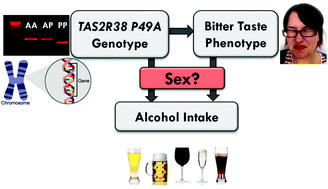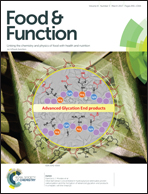A potential sex dimorphism in the relationship between bitter taste and alcohol consumption
Abstract
Background: Bitterness is an innate aversive taste important in detecting potentially toxic substances, including alcohol. However, bitter compounds exist in many foods and beverages, and can be desirable, such as in beer. TAS2R38 is a well-studied bitter taste receptor with common polymorphisms. Some have reported relationships between TAS2R38 genotypes, bitter taste phenotype and alcohol intake, however results have been mixed. These mixed results may be explained by the varying taste properties of different alcoholic beverages or a sex dimorphism in responses. Methods: Bitter taste phenotype was assessed using PROP taste test and TAS2R38-P49A genotype was assessed by RFLP-PCR. Alcohol intake was assessed by food frequency questionnaire and classified by beverage type (beer, wine, spirits or mixed drinks). The relationships between bitter taste phenotype and carriage of the P allele of the TAS2R38-A49P gene and alcohol intake were assessed adjusted for and stratified by sex, and the interaction between taste and sex was evaluated. Results: The relationship between alcohol intake and bitter taste phenotype varied by beverage type, with significant results for beer, spirits and mixed drinks, but not wine. When stratified, results varied by sex, and were only significant in males. Significant interactions were found for taster phenotype and sex (total alcohol intake and intake of beer and spirits). Results were similar for carriage of the TAS2R38-P49A P allele. Conclusions: Sex-specific interactions between bitter taste phenotype, TAS2R38 genotype and alcohol intake may explain variance in previous studies and may have implications for sex-specific disease risk and public health interventions.



 Please wait while we load your content...
Please wait while we load your content...